The National Investigation Agency (NIA) is a central agency in India, established in 2009 to tackle counter-terrorism and national security issues. Formed in response to the devastating Mumbai terror attacks of 2008, the NIA aims to enhance India’s ability to combat terrorism through dedicated investigations and prosecutions. Operating under the Ministry of Home Affairs, the agency works closely with state governments to address serious offenses threatening the country’s security.
The Role and Responsibilities of the National Investigation Agency (NIA)
Background: Formation of the National Investigation Agency (NIA)
- Establishment: The National Investigation Agency (NIA) was formed in response to the tragic Mumbai terror attacks of 2008, known as the 26/11 incident.
- This national tragedy highlighted the urgent need for a dedicated federal agency to combat terrorism.
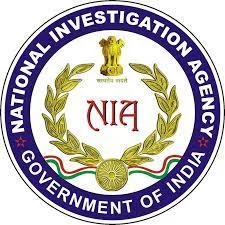
- Increase in Terrorism: India has experienced numerous large-scale terrorist attacks, including bomb blasts in major cities and regions affected by militancy and Left-Wing Extremism.
- Complex Linkages: Many terrorist incidents are connected through inter-state and international networks, often involving arms smuggling, drug trafficking, and the circulation of counterfeit currency.
- Need for a Central Agency: To address the complexities of terrorism-related issues, experts and committees, such as the Administrative Reforms Commission, recommended the establishment of a specialized agency.
- Legislative Action: Following comprehensive discussions, the government proposed legislation to create the National Investigation Agency.
- Formation: The NIA Act was enacted on December 31, 2008, resulting in the establishment of the NIA as India’s central counter-terrorism law enforcement agency.
Enroll now for UPSC Online Course
About Organization
- Leadership Structure: The NIA is led by a Director-General appointed by the Appointments Committee of the Cabinet (ACC) of the Central Government.
- The Director-General holds powers similar to those of a Director General of Police in a state regarding law enforcement.
- Headquarters and Branch Offices: The NIA’s headquarters are located in New Delhi, with branch offices in various cities, including Hyderabad, Guwahati, Mumbai, Lucknow, Kochi, Kolkata, Jammu, and Raipur.
- Specialized Unit: The NIA also includes a specialized unit known as the TFFC (Terror Funding and Fake Currency Cell), which focuses on issues related to counterfeit currency and terror funding.
- Parent Ministry: Operating under the administrative oversight of the Ministry of Home Affairs, Government of India, the NIA also receives support and cooperation from state governments in the investigation of offences stipulated in the NIA Act.
Vision of the NIA
The vision of the National Investigation Agency (NIA) can be summarized through the following key points:
- Professional Standards: The NIA strives to establish itself as a highly professional investigative agency that adheres to the highest international standards.
- Excellence in Counter-Terrorism: The NIA aspires to define the benchmarks for excellence in national-level counter-terrorism and investigations related to national security by cultivating a highly skilled and collaborative workforce.
- Deterrence Against Terrorism: The NIA seeks to create a strong deterrent for both existing and potential terrorist groups and individuals.
- Comprehensive Repository: The NIA’s vision includes evolving into a comprehensive repository of all information pertaining to terrorism, serving as a central hub for such data.
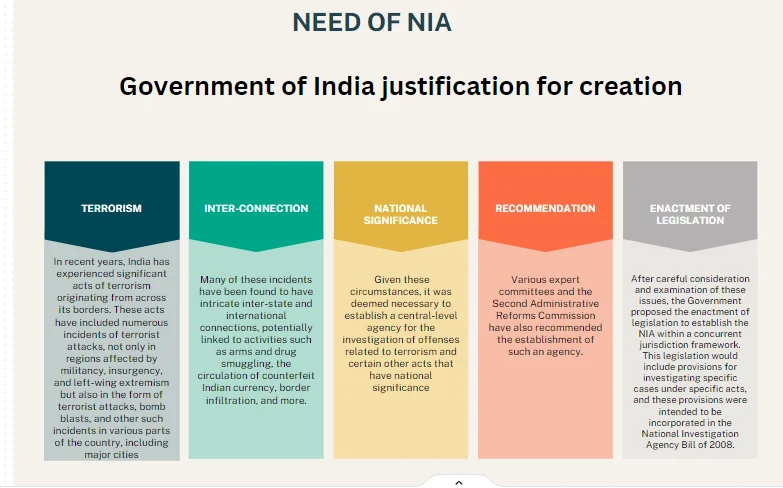
Mission of NIA
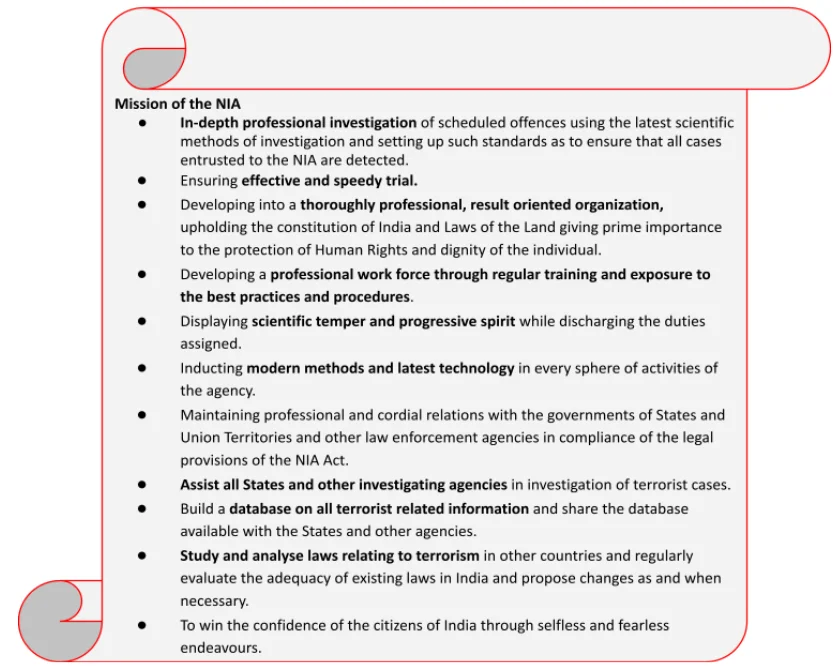
The Roles and Responsibilities of the NIA
The NIA is entrusted with the task of investigating and prosecuting crimes as outlined in the Schedule of the NIA Act.
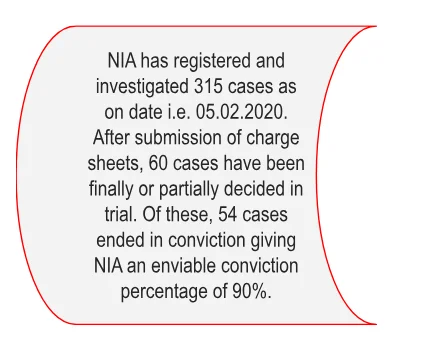
- Gathering, Organizing, and Analyzing Counter-Terrorism Information: In alignment with its mandate, the NIA actively gathers, organizes, and analyzes information related to counter-terrorism investigations.
- Collaboration and Information Sharing: The agency actively collaborates with sister intelligence agencies and law enforcement units at both the central and state government levels. It not only provides valuable assistance but also seeks support when required.
- Implementing Necessary Measures: The NIA takes proactive measures to ensure the prompt and effective execution of the provisions stipulated in the NIA Act.
Jurisdiction of the NIA
- Concurrent Jurisdiction: The NIA has concurrent jurisdiction to investigate and prosecute offences affecting the sovereignty, security, and integrity of India.
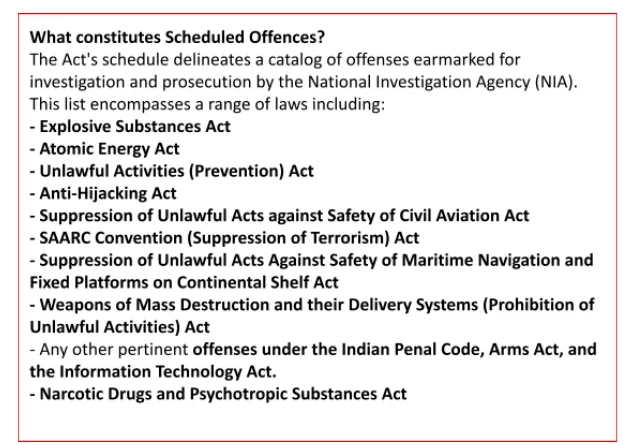
- Areas of Investigation: The NIA addresses issues related to the security of the state, friendly relations with foreign states, and offences under various acts that implement international treaties, agreements, conventions, and resolutions of the UN and its agencies.
- Schedule of Offences: The NIA’s jurisdiction covers the offences incorporated in the Schedule of the NIA Act.
- Empowered Probes by the NIA: The NIA is empowered to probe:
- Terror attacks including bomb blasts
- Hijacking of aircrafts and ships
- Attacks on nuclear installations
- use of weapons of mass destruction and
- Offenses related to (added by the 2019 amendment)-
- Human trafficking
- Counterfeit currency or bank notes
- Manufacture or sale of prohibited arms
- Cyber-terrorism and
- Offences under the Explosive Substances Act, 1908
- Unlawful Activities (Prevention) Amendment Act, 2019: empowered the officers of the NIA, of the rank of Inspector or above, to investigate cases, which earlier could only be investigated by the officers of the rank of Deputy Superintendent or Assistant Commissioner of Police or above.
National Investigation Agency (Amendment) Act 2019
- In 2019, the jurisdiction of the NIA was extended. The above-mentioned offences were also brought under NIA’s jurisdiction.
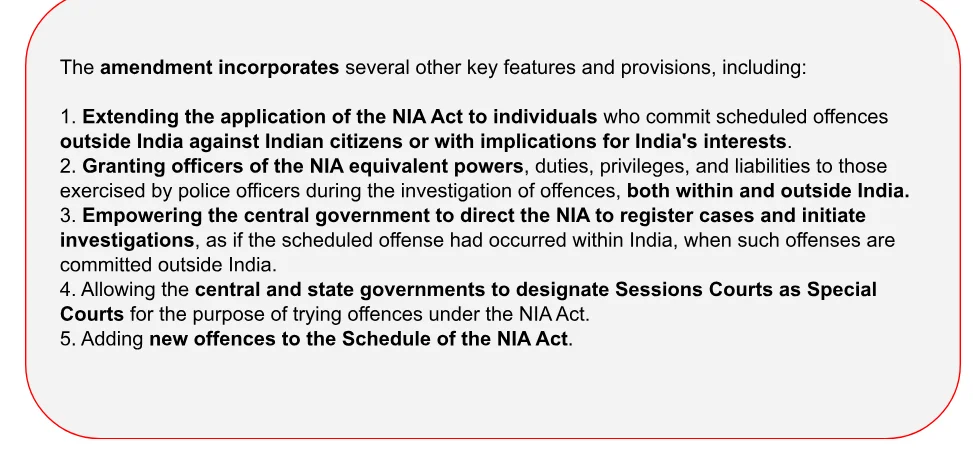
NIA Special Courts
- Establishment: NIA Special Courts are established by the Central Government for the trial of Scheduled Offenses in accordance with Sections 11 and 22 of the NIA Act 2008.
- Composition: These Special Courts are presided over by a judge appointed by the Central Government based on the recommendation of the Chief Justice of the High Court.
- In cases where it is deemed necessary, the Central Government can appoint additional judges to the Special Court, also upon the recommendation of the Chief Justice of the High Court.
- Jurisdiction of Special Courts:
-
-
- Powers of Special Courts: Special Courts are vested with all the powers of a court of sessions as per the provisions of the Code of Criminal Procedure, 1973.
- Jurisdiction Issues: If any question arises regarding the jurisdiction of a Special Court, the matter is referred to the Central Government, and its decision on the issue is considered final.
-
- Case Transfer by the Supreme Court: In exceptional cases where a peaceful, fair, impartial, and swift trial is not feasible, the Supreme Court can transfer a case from one Special Court to another within the same state or to a Special Court in a different state.
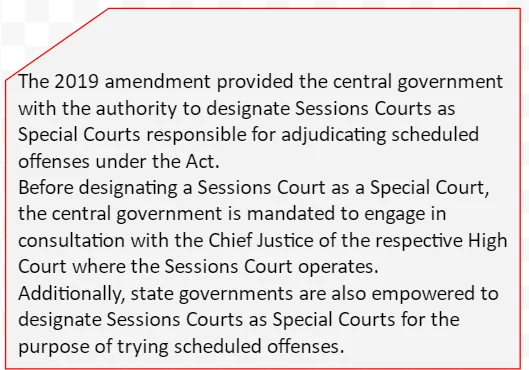
-
- Case Transfer by the High Court: Similarly, the High Court possesses the authority to transfer a case from a Special Court within the state to another Special Court in the same state.
Enroll now for UPSC Online Course
| Must Read | |
| Current Affairs | Editorial Analysis |
| Upsc Notes | Upsc Blogs |
| NCERT Notes | Free Main Answer Writing |
Conclusion
NIA continues to adapt, playing an integral role in safeguarding the nation’s security and upholding the rule of law.
- Its existence not only bolsters India’s counter-terrorism capabilities but also signifies the country’s commitment to maintaining national sovereignty and ensuring public safety in an increasingly complex global security landscape.
Sign up for the PWOnlyIAS Online Course by Physics Wallah and start your journey to IAS success today!
| Related Articles | |
| PART – III (CENTRAL GOVERNMENT) | PART -IV (STATE GOVERNMENT) |
| National Investigating Agency (NIA): Background, Structure, and Functions | High Courts in India |

 GS Foundation
GS Foundation Optional Course
Optional Course Combo Courses
Combo Courses Degree Program
Degree Program










